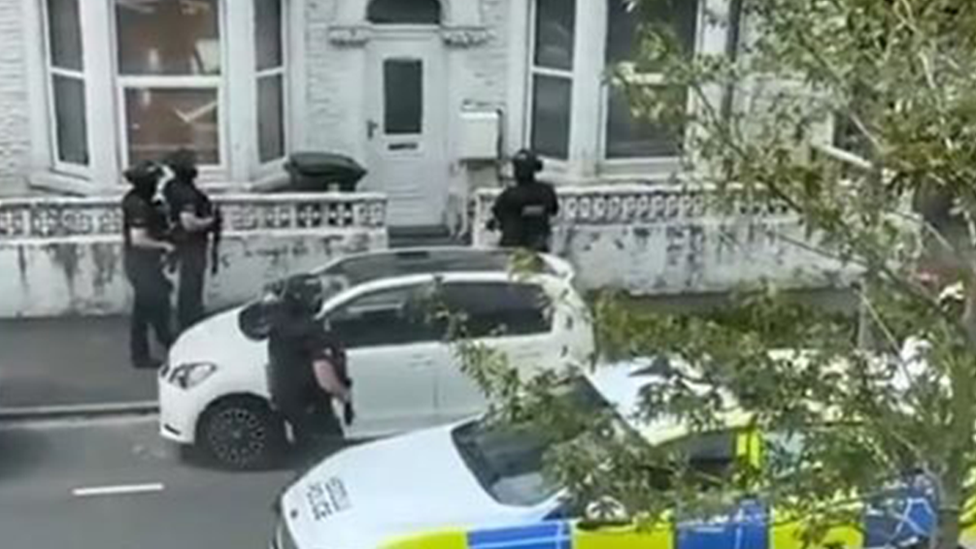Police pay woman £40,000 after using unlawful force
- Published
Police admitted the officers used unlawful force against the woman
A woman has been paid £40,000 compensation by a police force after two officers trespassed in her home and unlawfully arrested her.
Nottinghamshire Police has admitted that the officers used unlawful force against the woman and "committed batteries".
One of the officers was dismissed for gross misconduct but got his job back after appealing the sanction twice.
Neither of the police officers wanted to comment to the BBC.
Warning: This article contains strong language that some readers may find offensive
The woman, called Sharon, said she only complained initially because she did not believe the two men were real police officers.
Part of the incident was captured on the bailiff's body-worn camera.
"I still get frightened when someone comes and knocks on the door," said Sharon, who has been diagnosed with post-traumatic stress disorder (PTSD) as a result of what happened.
"Sometimes I get paranoid when I see police coming in my direction and I think 'What have I done wrong?'"
Sharon does not think she would have been believed without the bailiff's video footage as evidence.
She is calling for all police officers to switch on their own body-worn cameras when they enter people's homes.
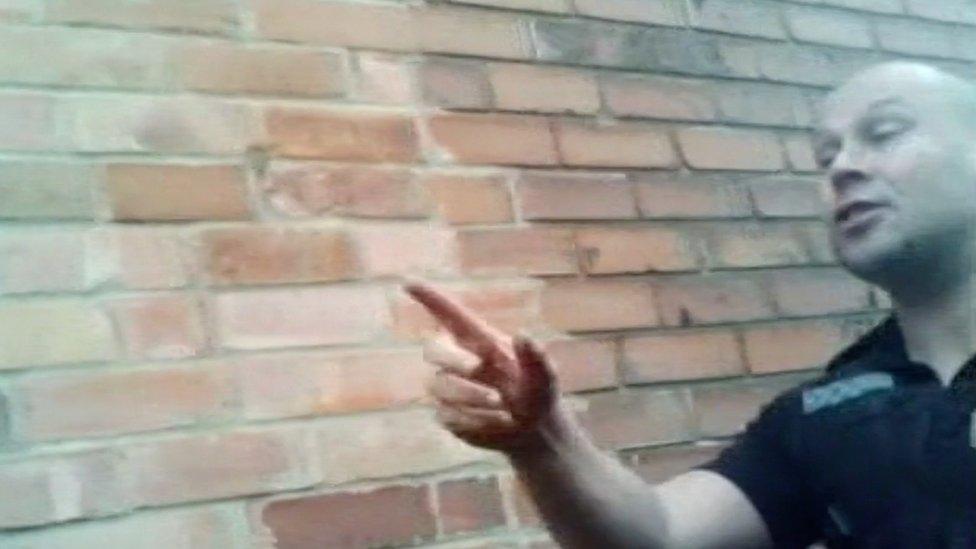
Sgt Flint repeatedly threatened to break Sharon's door down unless she let him in
The incident happened on 24 April 2017 but it has taken more than five years for Sharon to be given compensation.
The bailiff went to her home due to an outstanding debt.
He called the police alleging two young men in the street, who were related to Sharon, had stolen "a parcel" [singular] from his car.
One of the officers, Sgt Jonathan Flint, then arrived and indicated he would assist the bailiff in seizing items from the house - which police are not meant to do.
In the footage, the bailiff can be heard saying: "I've come to take that [Sharon's car] and then take goods out of the house as well."
Sgt Flint replies: "Yeah, OK, well we'll do that shall we?"
Sharon's aunt, who is standing outside, then points out that police should not assist bailiffs in seizing property.
Sgt Flint replies: "Yeah we are, so that's that. Well, that's what's happening, that's what's happening."
Sharon's aunt then points out the law again, but Sgt Flint dismisses her, saying: "Cool, that's fine, that's what's happening. Right, let's go."
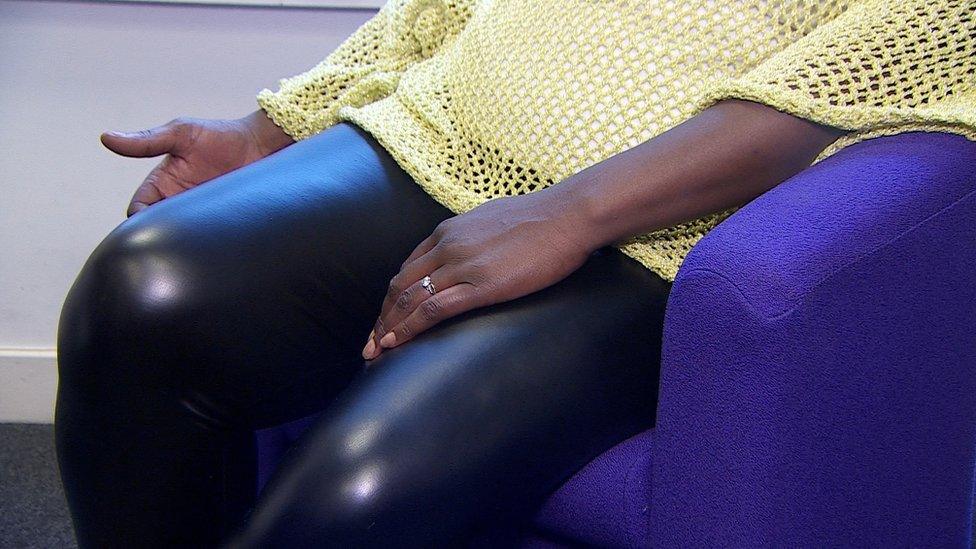
Sharon said she had swollen wrists from being in handcuffs and bruising and scratches to her arms
Sgt Flint then speaks to Sharon and falsely claims he has the power to "force entry" if she does not open her door, saying he suspects there are stolen "parcels" [plural] inside her house.
The other officer, PC Richard Elliott, then arrives. Sgt Flint repeatedly threatens to break the door down.
Sharon is shown letting the two officers in, but closes the door and locks it so the bailiff cannot enter the house.
The footage does not show what happened inside the house.
However, Sharon can be heard screaming and repeatedly shouting "help".
'Shocked and confused'
In her witness statement, Sharon said Sgt Flint accused her of "imprisoning" the officers, and repeatedly asked for her key, even though she had unlocked the door by this point.
"The way the two officers approached me was aggressive, frightening and intimidating," she said.
"From the looks on their faces and their body language, I just believed I was going to be attacked."
She said both officers had grabbed her as they tried to take her key, and Sgt Flint threatened to spray her with CS spray.
"I was extremely frightened, shocked and confused by what was happening because the police officers did not need the key," she said.
She said the officers had continued to "wrestle" with her and Sgt Flint arrested her for breach of the peace.
She said her keys had been forcibly taken from her and she had been handcuffed as she lay on her front, half on the floor and half on a sofa.
"Because the handcuffs were so tight, they were actually cutting into my wrists," Sharon said in her witness statement.
The footage then shows Sgt Flint opening the door to the bailiff, and saying: "You'll be having whatever you want. Get what you need, sorted."
His facial expression was described as "smirking" in background facts outlined to a police misconduct panel.
Sharon can then be heard repeatedly saying: "It's cutting my hand."
Sgt Flint tells the bailiff that Sharon has been arrested and he describes her as a "fucking loony".
The bailiff enters Sharon's house and looks round but does not take anything, as he does not find anything of value.
The bailiff then left, as did the police after removing Sharon's handcuffs. She was never charged.
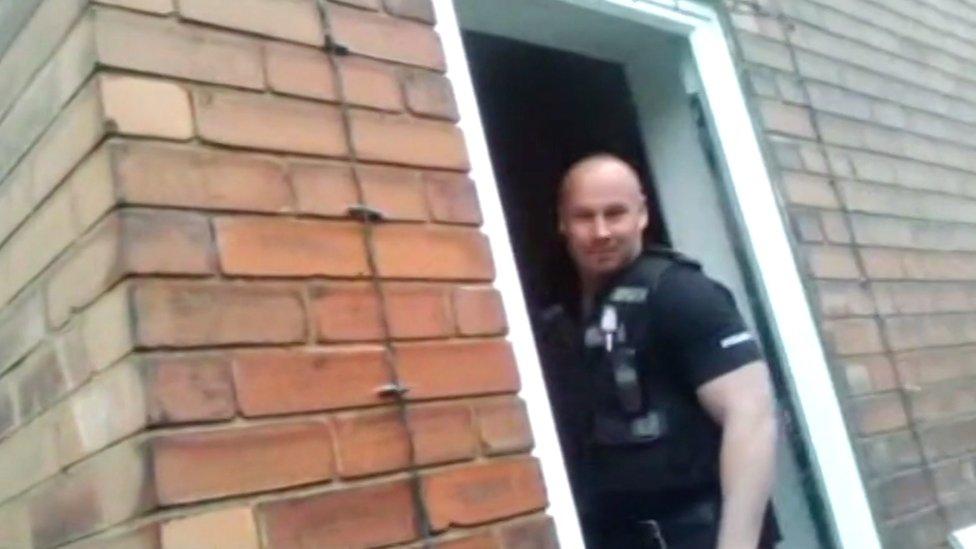
Sgt Flint was "smirking" when he opened the door to the bailiff, according to background facts outlined to a police misconduct panel
Sharon's complaint was investigated by Nottinghamshire Police's professional standards department, which concluded both officers had a case to answer for misconduct.
However, Sharon was not satisfied with this outcome so she appealed to the Independent Office for Police Conduct (IOPC), which partially upheld the appeal.
It agreed with Nottinghamshire Police that PC Elliott should attend a misconduct meeting, but said Sgt Flint had a case to answer for gross misconduct, which is more serious, and should therefore attend a gross misconduct hearing.
When Sharon gave evidence at this hearing, 12 of the 13 allegations were found proven, and Sgt Flint was dismissed.
However, the sanction was changed to a final written warning after Sgt Flint appealed twice to the Police Appeals Tribunal.
"Sharon was devastated with that news," said her solicitor Iain Gould, who specialises in claims against the police.
"It would appear the chief constable wasn't happy with that news either, because what then happened is that the chief constable sought a judicial review of that decision."
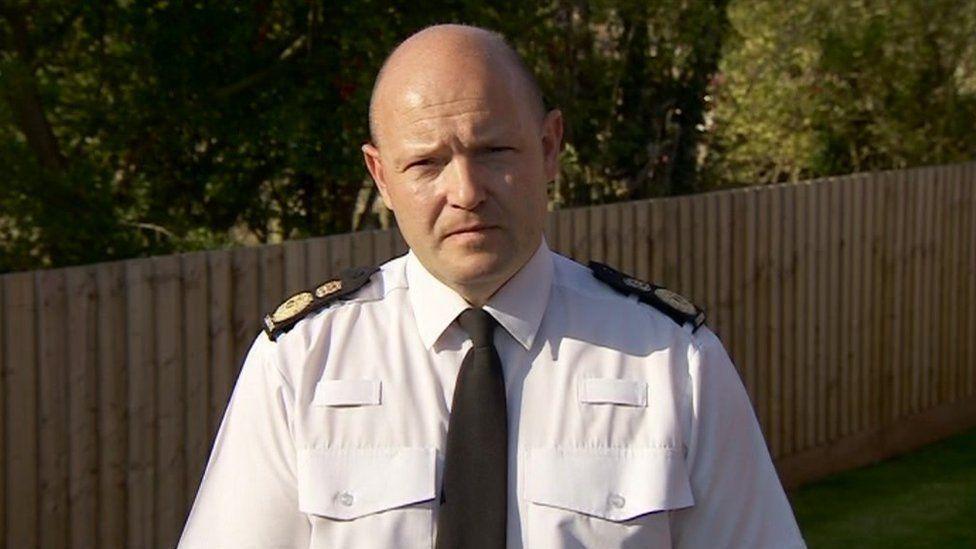
Craig Guildford, the force's chief constable, said the financial settlement was the right thing to do
The High Court overturned the tribunal's decision, remitted it for a fresh decision to be made, and the Police Appeals Tribunal's final decision was that Sgt Flint should receive a final written warning.
Chief Constable Craig Guildford said in a statement to the BBC: "We will always take these matters extremely seriously and I was very disappointed with the outcome of the appeal."
Sharon said she had found it distressing to give evidence at the misconduct hearings because it meant reliving what had happened.
She said she had felt she was treated as a criminal when she was cross-examined.
"The whole process took just over four-and-a-half years from start to finish," said Mr Gould.
"In many ways it was something of a merry-go-round, but from Sharon's perspective it was an ordeal from start to finish."
An internal misconduct meeting was held for PC Elliott, and a finding of misconduct was made, but there was no formal sanction.
No apology
Sharon has now been paid £40,000 after bringing a civil claim for compensation.
"Sadly that settlement did not include a letter of apology, and in fact Sharon offered to accept less money if Nottinghamshire Police provided an apology," said Mr Gould.
In what is known as a "defence" document, Nottinghamshire Police admitted the following:
Sgt Flint entered Sharon's house when he had no lawful power to do so, and therefore trespassed
Sgt Flint took hold of Sharon in an attempt to remove her keys by force
PC Elliott unlawfully arrested Sharon for breach of the peace
Sgt Flint "grappled" with Sharon and handcuffed her, with the assistance of PC Elliott. They used unlawful force to do this and unlawfully detained for her 10-15 minutes
PC Elliott removed Sharon's keys from her
Sgt Flint invited the bailiff into the property
The force admitted that both officers "committed batteries", and also that Sgt Flint "behaved in a high-handed and oppressive manner".
However, they denied that PC Elliott had trespassed by entering her home, as he had believed her two male relatives were inside. Police are allowed to enter premises if it is to arrest people on suspicion of theft.
Mr Guildford said to the BBC: "The subsequent financial settlement made was absolutely necessary, correct and the right thing to do.
"The force deeply regrets any suffering that has been caused to Sharon."
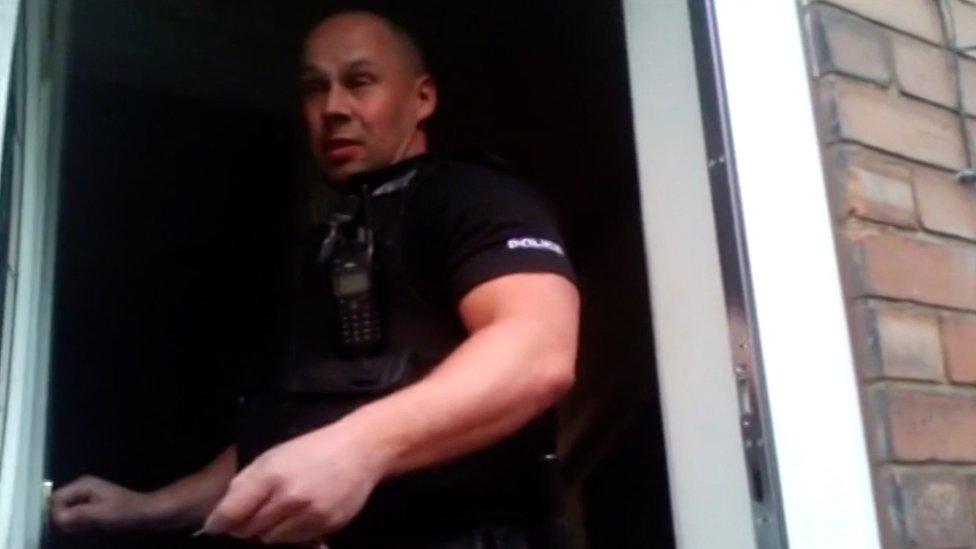
Sharon does not think her account would have been believed without the bailiff's footage
Mr Gould believes the case raises wider issues about police accountability and the use of body-worn cameras.
"Remarkably, neither police officer either had or deployed their body-worn camera, and it was only because the bailiff had a body-worn camera that the situation was captured on film," he said.
Mr Gould believes it should be mandatory for police officers to switch on their cameras when interacting with the public.
"Unfortunately, too many times in my experience, officers are not turning those cameras on, and therefore there is no objective record," he said.
"Even when cameras are turned on, I'm involved in cases where officers are encouraging footage to be deleted or simply not preserved."
Mr Guildford said: "Since this incident five years ago, I have ensured that body-worn cameras are issued on a personal basis to all our frontline staff."
'Still living in fear'
Sharon said she had swollen wrists from being in handcuffs, bruising and scratches to her arms, and stiffness to her head and neck for days afterwards.
However, she said most of the damage has been psychological, and she still suffers more than five years later.
Due to her PTSD, she now feels scared even when she sees a police car.
"For me it's still not resolved in my head because although I was paid compensation there was no apology with it," she said.
"He has ended up doing what he's done, got his job back, and it's all brushed under the carpet. I'm still living in fear."

Follow BBC East Midlands on Facebook, external, on Twitter, external, or on Instagram, external. Send your story ideas to eastmidsnews@bbc.co.uk, external.
Related topics
- Published31 August 2022
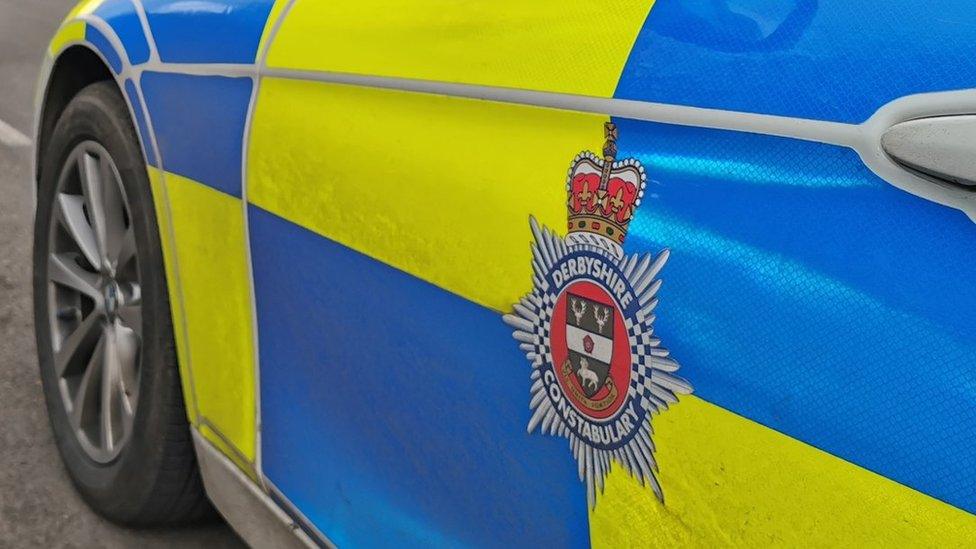
- Published14 July 2022
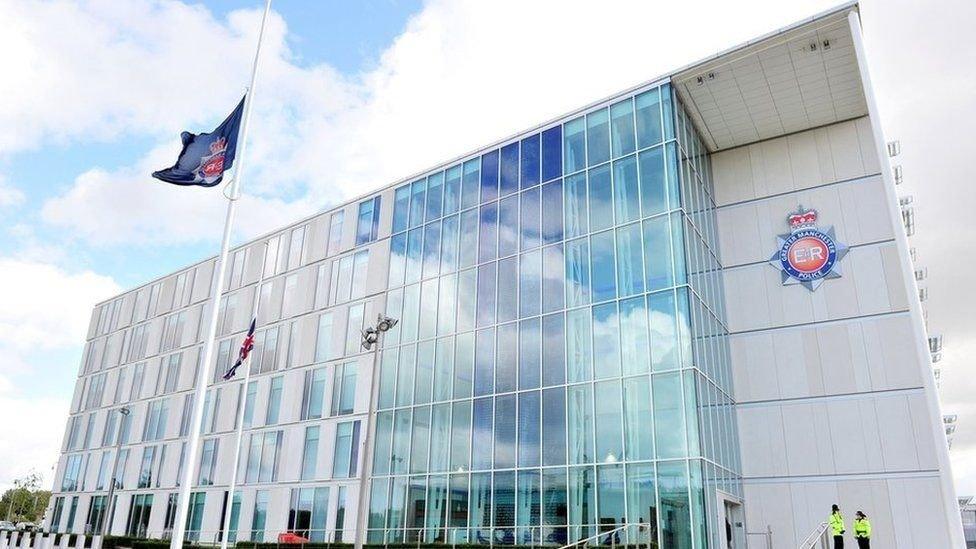
- Published27 July 2020
